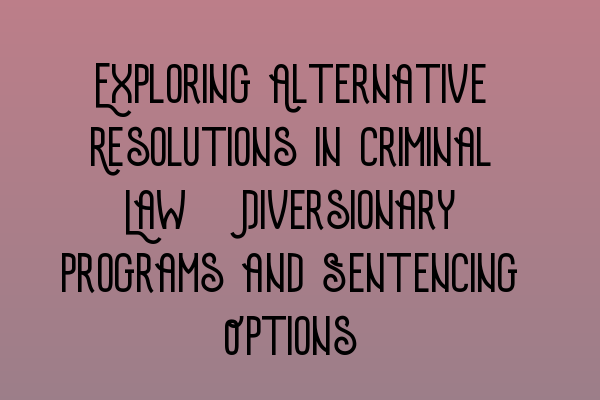Exploring Alternative Resolutions in Criminal Law: Diversionary Programs and Sentencing Options
When it comes to criminal law cases, finding alternative resolutions and sentencing options can often provide a more efficient and effective way to handle certain types of offenses. Diversionary programs and alternative sentencing can offer defendants a chance at rehabilitation and reduce the strain on the criminal justice system.
Diversionary Programs
Diversionary programs aim to divert eligible offenders away from traditional court proceedings and into alternative tracks that focus on rehabilitation and reform. These programs are typically available for first-time and non-violent offenders who may benefit from a second chance.
One popular form of diversionary program is the drug court, which focuses on addressing drug addiction issues rather than imposing severe punishments. Offenders enrolled in drug court programs may be required to attend counseling sessions, undergo regular drug tests, and participate in rehabilitation programs. The goal is to break the cycle of addiction and reduce the likelihood of reoffending.
Another form of diversionary program is the community service scheme, where offenders are required to perform unpaid work for a specified number of hours. This provides offenders with an opportunity to give back to the community while also learning the value of responsibility and hard work.
Sentencing Options
While diversionary programs focus on alternative resolutions outside of traditional court proceedings, there are also various sentencing options available within the judicial system that aim to provide fair and appropriate consequences for criminal offenses.
Community-based orders are one such option, where offenders are sentenced to serve their time in the community under supervision. This can include requirements such as regular check-ins, drug or alcohol rehabilitation, and participation in educational or vocational programs.
SQE 1 Practice Mocks FLK1 FLK2
Restorative justice programs are another alternative sentencing option that focuses on repairing the harm caused by the offense through dialogue and participation. Offenders may be required to meet with their victims and take responsibility for their actions, leading to a better understanding of the impact of their behavior.
Additionally, there are sentencing options like probation, suspended sentences, and fines that provide varying levels of punishment and accountability, depending on the severity of the offense.
Conclusion
Exploring alternative resolutions in criminal law can lead to more positive outcomes for both offenders and society as a whole. Diversionary programs and alternative sentencing options offer opportunities for rehabilitation and learning rather than solely focusing on punitive measures.
By utilizing these alternative options, we can work towards reducing recidivism rates, addressing underlying issues, and fostering a more compassionate and effective criminal justice system.
If you’re interested in learning more about the SQE exams and preparation, feel free to check out our related articles:
